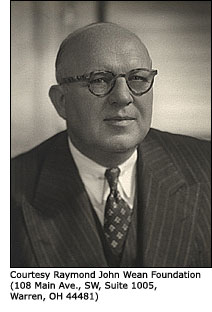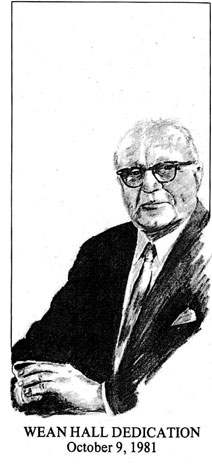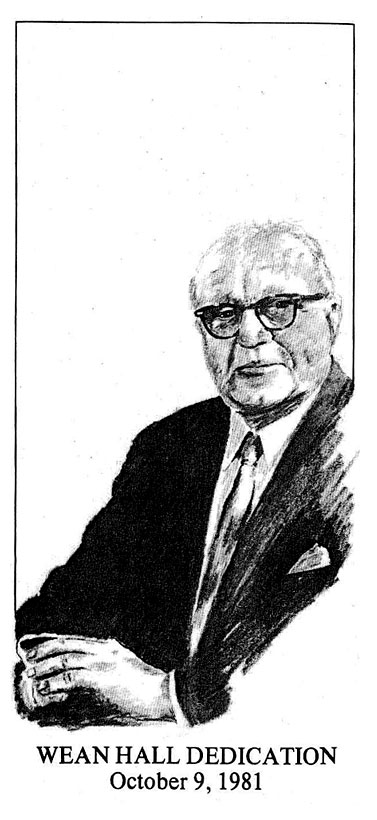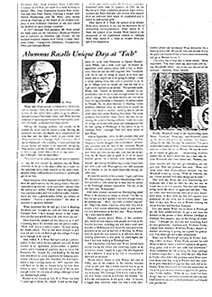
When it first opened in 1971, the $15.5 million building that brought Carnegie-Mellon students and researchers out of the campus basements and into the modern era bore the rather undistinguished moniker "Science Hall."
That was a dubious improvement over its original, equally dull name, "Research-Computer Building."
But on Oct. 9, 1981, "Science Hall" got a very distinguished name, indeed --- that of Raymond John "Jack" Wean, one of Carnegie Institute of Technology's first star alumni.
The 1917 graduate was considered one of the fathers of the modern American steel mill because of the innovations pioneered by his company, Wean Engineering, which today survives as Daneli Wean United and United Foundries Inc.
A December 1972 profile in Carnegie Alumni News told Wean's unique life story.
. . .
Alumnus Recalls Unique Days at 'Tech'
Raymond John Wean founded Wean Engineering in 1929 in one room in a bank building in Warren, Ohio. Wean Engineering became Wean Industries and then Wean United, following a merger with United Engineering, and Mr. Wean, after having served as Chairman of the Board of the merged company is now Honorary Chairman of the firm, which has facilities in many countries.
A 1917 Carnegie Tech graduate, Mr. Wean served for many years on the University's Board of Trustees and is currently an emeritus life trustee. He has received honorary degrees from Trinity College, Hartford, Conn.; Youngstown University, Youngstown, Ohio; and Carnegie-Mellon.
In the past twenty years, Mr. Wean has financially supported more than 50 students at CMU via the Raymond J. Wean scholarship program. Eight current students are Wean Scholars who receive their support from an endowed fund which he established and to which he adds annual gifts.
What makes R.J. Wean the subject of an Alumni News story, however, is not just his impressive list of outstanding accomplishments. What makes R.J. Wean the subject of an Alumni News feature is the uniqueness of his experiences related to Carnegie Tech. What makes R.J. Wean an Alumni News feature is his uniqueness.
. . .
When Jack Wean arrived in Oakland in 1914 to enroll at Carnegie Tech, he not only didn't have a place to live, he didn't have a place to go to school --- because Carnegie Tech didn't know Jack Wean had any intention of applying and because he had another problem --- he hadn't graduated from high school.
Solving the housing problem was simple, as he walked the street until he found a room. Solving the admission problem was slightly more complicated, but even that took less than a week. A year earlier Jack Wean had written to Carnegie Tech ("that new school out in Pittsburgh") for a catalog. "I read and read, but always found one section to be especially intriguing. That section said that in order to be admitted you had to have a high school education or its equivalent ... and I thought I had its equivalent."
"You won't get in unless you get the dean to approve it," was the first counsel the nineteen-year-old Wean received. So he sat in the dean's office for a week --- in the meantime doing some research on the dean's background (Dean Clifford Brown Connelley) --- and finally got to see him.
Dean Connelley's first response was that Wean didn't have the qualifications, but the young Eastern Pennsylvania native quoted the "or its equivalent" section from the catalog and added, "I think I have the equivalent. I'm a pattern-maker and I've studied at nights. I understand you were a pattern-maker before you became an educator."
"You're a pattern-maker?" the dean responded in apparent disbelief.
Wean explained that he had quit a job at Reading Hardware and "brought my tools out here to get into Carnegie Tech. I have enough money to last a year. Give me a year and if I don't do well, throw me out."
Dean Connelley seemed not too attentive, as if wondering about this nineteen-year-old pattern-maker. "Well, well, you're a pattern-maker," he kept saying, but finally added, "You've had enough nerve to quit your job and come out here to get into college. I've got nerve enough to let you in."
And, indeed, R.J. Wean had quit a job as a pattern-maker. In fact, before he was eighteen years old, he had worked as an apprentice patter-maker, a pattern-maker, and a foreman of a pattern shop in towns like Pottsville, Pa., Temple, Pa., and Reading, Pa. He had been threatened by union organizers for bringing automation (60 years ago)* into foundries. He had experienced a year working under an "MIT engineer who rode herd on me like no human being has ever done before or since." And he had done all of this to save enough money for one year of college, although he had not finished high school.
Known to his friends as Jack, R.J. Wean was born 77 years ago* in Barto, Pa., which is "still on the map" about ten miles from Pottstown in Eastern Pennsylvania. When "just a little under age" he became an apprentice metal pattern-maker with a firm in Pottstown, where he met the MIT engineer who "constantly took me to task for being so stupid as to have quit school, and so stupid not to be going to college. I took a verbal lashing from him until I promised to try to go to college --- and he would not take the lack of a high school diploma as an excuse."
The promise made, Wean --- then "sixteen or seventeen" --- jumped his apprenticeship and set out to earn enough money for one year of college. The next three months saw him move from the apprenticeship in Pottstown, to pattern-maker in Temple, Pa., to plant foreman in Reading. Union problems followed when he attempted to switch the plant from hand to machine molding, and he left the small plant and joined Reading Hardware. The union problems followed him there, but by this time he was nearing the point of having sufficient funds for a year of college, so he told both union and management that he was "going to Pittsburgh in September to go to Carnegie Tech." Carnegie Tech had never heard of Jack Wean.
And in September, 1914, he did precisely that, and within a week of arrival was enrolled at Carnegie Tech. Despite a "terrific struggle with mathematics" (eventually overcome with the help of his roommate Wayne McKee, who later became a professor of mathematics), Jack Wean survived the first year. Not only did he survive, but he found time to pitch in 12 of 14 varsity baseball games "as a reliever since freshmen never started," and during the following summer found himself with a job with Westinghouse, but still uncertain as to whether or not he could financially manage another year.
Around the middle of the summer "I got a call from Mr. Hamerschlag" --- Arthur Anton Hamerschlag, CMU's first president --- "who asked me to meet him for dinner at the Pittsburgh Athletic Association." The call, to say the least, was "unexpected."
After some pleasant conversation, Hamerschlag asked Wean if he planned to return to school. "I'd like to, but I'm not sure how quickly I can earn enough money for another year." "Well," the CMU president responded, "that's the reason I had you come here. You are to receive a full tuition scholarship based on your activities and performance in the first year."
Wean remarks: "So I went back to school."
Through various means, Wean, in that academic year, made several contacts with people involved in the foundry business, including one who had a small steel foundry in McKeesport with much the same production problems as the one he had left in Reading. So Wean, now 20, spent the next summer as an efficiency man in that plant "at much higher pay than I had been making at Westinghouse."
The scholarship continued and Wean earned more money during the school year correcting papers in an economics course "taught by a guy who also happened to be a Marxist. I acted as his foil in discussions of Marxism and socialism."
Shortly before Easter in Jack Wean's last year at CMU, one of his contacts in the foundry business called to tell Jack that a friend wanted him to go to Warren, Ohio, to appraise a small plant he was thinking of buying. The Carnegie Tech senior went to Warren over Easter vacation to evaluate the foundry "for $50 a day and expenses. It was quite a deal." It became a bigger deal, however, when less than a week later, another phone call summoned Wean downtown for a meeting with a Mr. Woodruff, who had decided to buy the plant and wanted Wean to leave school immediately and go to Warren to run it.
"I'm sorry, but I want first to finish school," Wean responded. "You won't learn any more from now on," was Woodruff's retort, "you're too near the end of the semester." However, Wean insisted.
Finally, Woodruff asked if Mr. Hamerschlag knew Wean. "I said yes," Wean says, "and Woodruff picked up the phone and said to his secretary, 'Get Hamerschlag for me.'"
"Hello, Hammy," he continued, "I've got a student here name of Wean. I want him to leave school and run a plant for me in Warren. He says he won't do it --- wants to graduate." Hamerschlag evidently replied that he didn't think that was a bad idea, because Woodruff, after some silence, said, "Hammy, you know damned well that he's got everything you can give him. Why not graduate him early?" Wean will never know what Hamerschlag's response was, but Woodruff ended up saying, "Well, do whatever you can. I know damned well these things can be done."
The same day Wean met with Hamerschlag and explained that it had not been his idea, but that he would like to do it if possible. Two days later Hamerschlag called the senior in again and told him, "You can either take examinations from all of your department heads, or have them say they will approve your graduation on the work you've already done." Less than 10 days later Wean was in Warren, running the Aetna Foundry and Machine Company.
Two days before Wean was to return to Pittsburgh for the Tech commencement, he got a call from the Institute in the person of William B. Hartman, then assistant dean of the College of Industries. "I thought you said you had everything fixed for your graduation," Hartman said. "Professor Trinks" --- famed Tech Professor Willibald Trinks --- "doesn't remember consenting to giving you a grade for graduation. You better get down here immediately."
Wean was in Pittsburgh camping on Trinks' doorstep within 24 hours. When Trinks arrived, he told Wean he had to "make a farewell speech to the graduating group and would talk with him afterwards." Wean remembers the talk as being very long --- perhaps it seemed longer than it was. After the talk, they went to Trinks' office, where the professor asked Wean questions about what they made at Warren, how they molded tin pots, what kind of pig iron they used, and so on. Finally, Wean could stand no more and asked when he was going to be given an examination or approval for graduation. Trinks replied, "What do you think I've been doing? Anyway, I suddenly remembered yesterday that I had talked to you and granted permission, so I okayed your graduation."
---
Originally appeared in Carnegie Alumni News, December 1972, p. 5.
* --- Editor's note: From when this article was first published.
That was a dubious improvement over its original, equally dull name, "Research-Computer Building."
But on Oct. 9, 1981, "Science Hall" got a very distinguished name, indeed --- that of Raymond John "Jack" Wean, one of Carnegie Institute of Technology's first star alumni.
The 1917 graduate was considered one of the fathers of the modern American steel mill because of the innovations pioneered by his company, Wean Engineering, which today survives as Daneli Wean United and United Foundries Inc.
A December 1972 profile in Carnegie Alumni News told Wean's unique life story.
. . .
Alumnus Recalls Unique Days at 'Tech'
Raymond John Wean founded Wean Engineering in 1929 in one room in a bank building in Warren, Ohio. Wean Engineering became Wean Industries and then Wean United, following a merger with United Engineering, and Mr. Wean, after having served as Chairman of the Board of the merged company is now Honorary Chairman of the firm, which has facilities in many countries.
A 1917 Carnegie Tech graduate, Mr. Wean served for many years on the University's Board of Trustees and is currently an emeritus life trustee. He has received honorary degrees from Trinity College, Hartford, Conn.; Youngstown University, Youngstown, Ohio; and Carnegie-Mellon.
In the past twenty years, Mr. Wean has financially supported more than 50 students at CMU via the Raymond J. Wean scholarship program. Eight current students are Wean Scholars who receive their support from an endowed fund which he established and to which he adds annual gifts.
What makes R.J. Wean the subject of an Alumni News story, however, is not just his impressive list of outstanding accomplishments. What makes R.J. Wean the subject of an Alumni News feature is the uniqueness of his experiences related to Carnegie Tech. What makes R.J. Wean an Alumni News feature is his uniqueness.
. . .
When Jack Wean arrived in Oakland in 1914 to enroll at Carnegie Tech, he not only didn't have a place to live, he didn't have a place to go to school --- because Carnegie Tech didn't know Jack Wean had any intention of applying and because he had another problem --- he hadn't graduated from high school.
Solving the housing problem was simple, as he walked the street until he found a room. Solving the admission problem was slightly more complicated, but even that took less than a week. A year earlier Jack Wean had written to Carnegie Tech ("that new school out in Pittsburgh") for a catalog. "I read and read, but always found one section to be especially intriguing. That section said that in order to be admitted you had to have a high school education or its equivalent ... and I thought I had its equivalent."
"You won't get in unless you get the dean to approve it," was the first counsel the nineteen-year-old Wean received. So he sat in the dean's office for a week --- in the meantime doing some research on the dean's background (Dean Clifford Brown Connelley) --- and finally got to see him.
Dean Connelley's first response was that Wean didn't have the qualifications, but the young Eastern Pennsylvania native quoted the "or its equivalent" section from the catalog and added, "I think I have the equivalent. I'm a pattern-maker and I've studied at nights. I understand you were a pattern-maker before you became an educator."
"You're a pattern-maker?" the dean responded in apparent disbelief.
Wean explained that he had quit a job at Reading Hardware and "brought my tools out here to get into Carnegie Tech. I have enough money to last a year. Give me a year and if I don't do well, throw me out."
Dean Connelley seemed not too attentive, as if wondering about this nineteen-year-old pattern-maker. "Well, well, you're a pattern-maker," he kept saying, but finally added, "You've had enough nerve to quit your job and come out here to get into college. I've got nerve enough to let you in."
And, indeed, R.J. Wean had quit a job as a pattern-maker. In fact, before he was eighteen years old, he had worked as an apprentice patter-maker, a pattern-maker, and a foreman of a pattern shop in towns like Pottsville, Pa., Temple, Pa., and Reading, Pa. He had been threatened by union organizers for bringing automation (60 years ago)* into foundries. He had experienced a year working under an "MIT engineer who rode herd on me like no human being has ever done before or since." And he had done all of this to save enough money for one year of college, although he had not finished high school.
Known to his friends as Jack, R.J. Wean was born 77 years ago* in Barto, Pa., which is "still on the map" about ten miles from Pottstown in Eastern Pennsylvania. When "just a little under age" he became an apprentice metal pattern-maker with a firm in Pottstown, where he met the MIT engineer who "constantly took me to task for being so stupid as to have quit school, and so stupid not to be going to college. I took a verbal lashing from him until I promised to try to go to college --- and he would not take the lack of a high school diploma as an excuse."
The promise made, Wean --- then "sixteen or seventeen" --- jumped his apprenticeship and set out to earn enough money for one year of college. The next three months saw him move from the apprenticeship in Pottstown, to pattern-maker in Temple, Pa., to plant foreman in Reading. Union problems followed when he attempted to switch the plant from hand to machine molding, and he left the small plant and joined Reading Hardware. The union problems followed him there, but by this time he was nearing the point of having sufficient funds for a year of college, so he told both union and management that he was "going to Pittsburgh in September to go to Carnegie Tech." Carnegie Tech had never heard of Jack Wean.
And in September, 1914, he did precisely that, and within a week of arrival was enrolled at Carnegie Tech. Despite a "terrific struggle with mathematics" (eventually overcome with the help of his roommate Wayne McKee, who later became a professor of mathematics), Jack Wean survived the first year. Not only did he survive, but he found time to pitch in 12 of 14 varsity baseball games "as a reliever since freshmen never started," and during the following summer found himself with a job with Westinghouse, but still uncertain as to whether or not he could financially manage another year.
Around the middle of the summer "I got a call from Mr. Hamerschlag" --- Arthur Anton Hamerschlag, CMU's first president --- "who asked me to meet him for dinner at the Pittsburgh Athletic Association." The call, to say the least, was "unexpected."
After some pleasant conversation, Hamerschlag asked Wean if he planned to return to school. "I'd like to, but I'm not sure how quickly I can earn enough money for another year." "Well," the CMU president responded, "that's the reason I had you come here. You are to receive a full tuition scholarship based on your activities and performance in the first year."
Wean remarks: "So I went back to school."
Through various means, Wean, in that academic year, made several contacts with people involved in the foundry business, including one who had a small steel foundry in McKeesport with much the same production problems as the one he had left in Reading. So Wean, now 20, spent the next summer as an efficiency man in that plant "at much higher pay than I had been making at Westinghouse."
The scholarship continued and Wean earned more money during the school year correcting papers in an economics course "taught by a guy who also happened to be a Marxist. I acted as his foil in discussions of Marxism and socialism."
Shortly before Easter in Jack Wean's last year at CMU, one of his contacts in the foundry business called to tell Jack that a friend wanted him to go to Warren, Ohio, to appraise a small plant he was thinking of buying. The Carnegie Tech senior went to Warren over Easter vacation to evaluate the foundry "for $50 a day and expenses. It was quite a deal." It became a bigger deal, however, when less than a week later, another phone call summoned Wean downtown for a meeting with a Mr. Woodruff, who had decided to buy the plant and wanted Wean to leave school immediately and go to Warren to run it.
"I'm sorry, but I want first to finish school," Wean responded. "You won't learn any more from now on," was Woodruff's retort, "you're too near the end of the semester." However, Wean insisted.
Finally, Woodruff asked if Mr. Hamerschlag knew Wean. "I said yes," Wean says, "and Woodruff picked up the phone and said to his secretary, 'Get Hamerschlag for me.'"
"Hello, Hammy," he continued, "I've got a student here name of Wean. I want him to leave school and run a plant for me in Warren. He says he won't do it --- wants to graduate." Hamerschlag evidently replied that he didn't think that was a bad idea, because Woodruff, after some silence, said, "Hammy, you know damned well that he's got everything you can give him. Why not graduate him early?" Wean will never know what Hamerschlag's response was, but Woodruff ended up saying, "Well, do whatever you can. I know damned well these things can be done."
The same day Wean met with Hamerschlag and explained that it had not been his idea, but that he would like to do it if possible. Two days later Hamerschlag called the senior in again and told him, "You can either take examinations from all of your department heads, or have them say they will approve your graduation on the work you've already done." Less than 10 days later Wean was in Warren, running the Aetna Foundry and Machine Company.
Two days before Wean was to return to Pittsburgh for the Tech commencement, he got a call from the Institute in the person of William B. Hartman, then assistant dean of the College of Industries. "I thought you said you had everything fixed for your graduation," Hartman said. "Professor Trinks" --- famed Tech Professor Willibald Trinks --- "doesn't remember consenting to giving you a grade for graduation. You better get down here immediately."
Wean was in Pittsburgh camping on Trinks' doorstep within 24 hours. When Trinks arrived, he told Wean he had to "make a farewell speech to the graduating group and would talk with him afterwards." Wean remembers the talk as being very long --- perhaps it seemed longer than it was. After the talk, they went to Trinks' office, where the professor asked Wean questions about what they made at Warren, how they molded tin pots, what kind of pig iron they used, and so on. Finally, Wean could stand no more and asked when he was going to be given an examination or approval for graduation. Trinks replied, "What do you think I've been doing? Anyway, I suddenly remembered yesterday that I had talked to you and granted permission, so I okayed your graduation."
---
Originally appeared in Carnegie Alumni News, December 1972, p. 5.
* --- Editor's note: From when this article was first published.
Image2:

Image3:

Image4:

For More Information:
Jason Togyer | 412-268-8721 | jt3y@cs.cmu.edu

